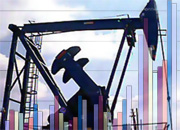In 9M 2010, the Company’s revenues increased by 42% year-on-year, to USD 45.7 bln.
In Q3 2010, Rosneft’s EBITDA amounted to USD 4.6 bln, up 27% compared to Q3 2009. The increase was tempered by a series of external factors: real strengthening of the ruble against the USD, higher tax payments and growth of transportation costs, substantially exceeding CPI. In 9M 2010, the Company’s EBITDA reached USD 13.8 bln, which is an increase of 45% compared to 9M 2009.
Net income for Q3 2010 amounted to USD 2.6 bln, which is 1.2 times more than in Q3 2009. In 9M 2010, Rosneft’s net income amounted to USD 7.6 bln, up 57% year-on-year.
In Q3 2010, Rosneft continued to generate material free cash flow and reduce net debt. At the end of Q3 2010, net debt totalled less than USD 14 bln, such level not achieved since the end of 2006 (prior to acquisition of major producing and refining assets in 2007), and the Company’s Net Debt/EBITDA ratio decreased to 0.78x.
In Q3 2010, Rosneft’s average daily crude oil production (including production by subsidiaries and share in production by affiliates) amounted to 2,332 th. barrels per day (bpd), up 5.3% compared to Q3 2009. The primary contributors of production growth were Vankor and Verkhnechonsk in Eastern Siberia, and Samaraneftegaz. The growth was tempered by production suspension at Sakhalin-1 due to planned maintenance works in August 2010. In 9M 2010, the Company’s average daily crude oil output increased by 7.5% year-on-year, to 2,312 bpd.
In Q3 2010, Rosneft produced 12.42 mln tonnes of petroleum products, exceeding the level of Q3 2009 by 3.4% and the level of Q2 2010 by 11.3%. Considerable quarter-on-quarter output growth was primarily the result of reduced output in Q2 2010 due to maintenance works carried out in April–June 2010. The majority of additional petroleum product output was sold domestically. The Company’s wholesale sales of petroleum products via commodity exchanges grew by 40%, to 0.94 mln tonnes, and retail sales increased by 12%, to 1.1 mln tonnes. In 9M 2010, Rosneft’s petroleum product output was 35.64 mln tonnes, an increase of 1.1% compared to 9M 2009.
In Q3 2010, Rosneft continued to show leading cost discipline. The Company’s unit lifting costs decreased to USD 2.7 per bbl quarter-on-quarter, while unit refining expenses fell to USD 2.1 per bbl.
The Company’s success in cost cutting was muted by increases in transportation costs and tax payments. In 9M 2010, transportation costs increased by 36% year-on-year, to USD 5.2 bln, largely due to the increase in transportation tariffs of natural monopolies. Share of tax payments in total revenues increased from 45% to 49%.
Commenting on the results, Rosneft’s President Eduard Khudainatov said: “Our third quarter results reflect Rosneft’s potential for further efficient growth. Recent successful efforts to stabilize production at key subsidiaries allow us to now increase our 2010 production growth target up to 5.5–6% from 4.5% while maintaining our leading cost position. At the same time, we continue to pay higher taxes - USD 22 bln during the first 9 months alone, which is almost 52% more than in the same period of 2009. Our key priority remains continued discussions with our core shareholder around taxation of the Russian oil industry in order to launch new projects and facilitate the transformation of Rosneft into a leading global energy company.”
08 Февраля 2026 | воскресенье | 17:55


